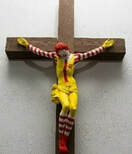25 apr 2019
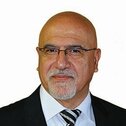
By Rifat Kassis
For Christians in the Holy Land, Easter is the most important of Christian holy days. In fact, Palestinians refer to it as al-Eid al-Kabir (the Big Feast) while Christmas is known as al-Eid al-Saghir (the Little Feast).
The Saturday before Easter Sunday is the climax of the Holy Week in occupied Palestine. Sabt Al-Nur (Saturday of Light) is an Orthodox tradition that marks the end of the Easter fast. Tradition holds that every year on the Saturday prior to Easter, a flame arises from the tomb of Christ at the Church of the Holy Sepulcher in Jerusalem.
The miracle of the flame is celebrated by lighting candles from this flame in Jerusalem and carrying it from one town and village to another in Palestine.
Although Sabt al-Nur is an Orthodox tradition, Christians of all denominations have attended the ceremony in Jerusalem for generations, in what has always been a major community event for Christians in Palestine.
But last year, only a few hundred Palestinians made it to the Church of the Holy Sepulcher for the ceremony of the Holy Fire. Most Palestinian Christians have never seen the miraculous flame – not because we don’t care about the tradition – but because Israel restricts us, especially our youth, from entering Jerusalem. Jerusalem: the sacred city of Christians all over the world; the place of Jesus’s crucifixion and resurrection, the birthplace of Christianity itself, the site of its first churches.
As a little boy, I remember travelling to Jerusalem from our village of Beit Sahour. Beit Sahour is located just outside of Bethlehem, and is less than 15 km from Jerusalem. Yet it is a trip that took several hours due to the “no-man’s zone” imposed on us when Israel was created in 1948. This forced us to go through a route nearly three times longer than the normal way.
Now, I can no longer visit Jerusalem at all. I am a former political prisoner, and have been placed on an Israeli “security” list. The Israeli authorities will not grant me a permit to visit Jerusalem. My 35-year-old son has traveled widely and seen almost half the world, but he too is barred from Jerusalem.
Our story is not unique. Palestinians - indigenous to the Holy Land and who live a few kilometers away from Jerusalem - must beg for permission to visit, endure humiliating searches and pass through walls and checkpoints, while pilgrims from Germany, the United States or Peru can fly in for Easter.
For most Palestinians – whether Christian or Muslim - Jerusalem is the city we love the most and visit the least.
As an Easter “goodwill” gesture, Israel says it has issued approximately 10 000 permits to Palestinians from the occupied West Bank and 500 permits to Christians in the besieged Gaza Strip, where several thousand live. Is it really goodwill to force people to apply for permits to visit and worship in their most sacred city during their most sacred time? Is it goodwill to turn the sacred city into a military zone?
During Easter, barriers are set up in the early hours of the morning in the courtyard at the Church of the Holy Sepulchre. Its aim is to keep people out of the Church: a site central to Jesus’s death, crucifixion and resurrection.
Israeli army officers are present around the gates of the Old City and passages that lead to the Holy Sepulcher, as well as inside the Church itself and on its roof. These measures restrict freedom of movement for Palestinians, preventing Palestinian Christians from worshiping at the Church during this auspicious period. Even priests are not allowed to move freely. Is this what freedom of worship looks like?
Today, Palestinians feel that not only are our religious, cultural, and spiritual celebrations under attack but our whole existence as well. In fact, many Palestinians refer to our experience of living under Israeli occupation and the suffering we endure as “walking the Via Dolorosa” or the Way of the Cross.
However, this Way of the Cross is not confined to Easter week, but has been going for 70 years. The stations of suffering that are visited include: checkpoints, permits, refugee camps, blockade, home demolitions, detention without trial, and bombing.
Today, Palestinians are still walking the Way of the Cross, and anxiously awaiting the Day of Resurrection - the day the stone that blocks the tomb of occupation is rolled away.
The message of Easter and the Resurrection is that those liberated by God cannot be made slaves by anyone. But this is what is exactly what is happening today in occupied Palestine. Israel is asking the Palestinian people to let their freedom die, so that the Israeli people can live.
In the Holy Land - the land of the Resurrection - we see one group of people committed to security, justice and peace for themselves only that is built on injustice and occupation for another set of people. We see one human being living at the expense of another human being. Jesus Christ died and rose from the dead to give life for all, to enable everyone to triumph over death and become a maker of life, justice and peace for oneself; their people; and all the peoples of the earth.
Freedom for one group cannot come through the oppression of another.
Israeli security and peace cannot be built at the expense of Palestinian security, dignity and peace. The occupation of Palestinian life must end, so that both Israelis and Palestinians may live as equal human beings.
- Rifat Odeh Kassis is the coordinator of Kairos Palestine, an umbrella movement of Palestinian Christians of various denominations, which advocates for ending the Israeli occupation and achieving a just solution to the conflict. The article was published in SAHARA REPORTERS.
For Christians in the Holy Land, Easter is the most important of Christian holy days. In fact, Palestinians refer to it as al-Eid al-Kabir (the Big Feast) while Christmas is known as al-Eid al-Saghir (the Little Feast).
The Saturday before Easter Sunday is the climax of the Holy Week in occupied Palestine. Sabt Al-Nur (Saturday of Light) is an Orthodox tradition that marks the end of the Easter fast. Tradition holds that every year on the Saturday prior to Easter, a flame arises from the tomb of Christ at the Church of the Holy Sepulcher in Jerusalem.
The miracle of the flame is celebrated by lighting candles from this flame in Jerusalem and carrying it from one town and village to another in Palestine.
Although Sabt al-Nur is an Orthodox tradition, Christians of all denominations have attended the ceremony in Jerusalem for generations, in what has always been a major community event for Christians in Palestine.
But last year, only a few hundred Palestinians made it to the Church of the Holy Sepulcher for the ceremony of the Holy Fire. Most Palestinian Christians have never seen the miraculous flame – not because we don’t care about the tradition – but because Israel restricts us, especially our youth, from entering Jerusalem. Jerusalem: the sacred city of Christians all over the world; the place of Jesus’s crucifixion and resurrection, the birthplace of Christianity itself, the site of its first churches.
As a little boy, I remember travelling to Jerusalem from our village of Beit Sahour. Beit Sahour is located just outside of Bethlehem, and is less than 15 km from Jerusalem. Yet it is a trip that took several hours due to the “no-man’s zone” imposed on us when Israel was created in 1948. This forced us to go through a route nearly three times longer than the normal way.
Now, I can no longer visit Jerusalem at all. I am a former political prisoner, and have been placed on an Israeli “security” list. The Israeli authorities will not grant me a permit to visit Jerusalem. My 35-year-old son has traveled widely and seen almost half the world, but he too is barred from Jerusalem.
Our story is not unique. Palestinians - indigenous to the Holy Land and who live a few kilometers away from Jerusalem - must beg for permission to visit, endure humiliating searches and pass through walls and checkpoints, while pilgrims from Germany, the United States or Peru can fly in for Easter.
For most Palestinians – whether Christian or Muslim - Jerusalem is the city we love the most and visit the least.
As an Easter “goodwill” gesture, Israel says it has issued approximately 10 000 permits to Palestinians from the occupied West Bank and 500 permits to Christians in the besieged Gaza Strip, where several thousand live. Is it really goodwill to force people to apply for permits to visit and worship in their most sacred city during their most sacred time? Is it goodwill to turn the sacred city into a military zone?
During Easter, barriers are set up in the early hours of the morning in the courtyard at the Church of the Holy Sepulchre. Its aim is to keep people out of the Church: a site central to Jesus’s death, crucifixion and resurrection.
Israeli army officers are present around the gates of the Old City and passages that lead to the Holy Sepulcher, as well as inside the Church itself and on its roof. These measures restrict freedom of movement for Palestinians, preventing Palestinian Christians from worshiping at the Church during this auspicious period. Even priests are not allowed to move freely. Is this what freedom of worship looks like?
Today, Palestinians feel that not only are our religious, cultural, and spiritual celebrations under attack but our whole existence as well. In fact, many Palestinians refer to our experience of living under Israeli occupation and the suffering we endure as “walking the Via Dolorosa” or the Way of the Cross.
However, this Way of the Cross is not confined to Easter week, but has been going for 70 years. The stations of suffering that are visited include: checkpoints, permits, refugee camps, blockade, home demolitions, detention without trial, and bombing.
Today, Palestinians are still walking the Way of the Cross, and anxiously awaiting the Day of Resurrection - the day the stone that blocks the tomb of occupation is rolled away.
The message of Easter and the Resurrection is that those liberated by God cannot be made slaves by anyone. But this is what is exactly what is happening today in occupied Palestine. Israel is asking the Palestinian people to let their freedom die, so that the Israeli people can live.
In the Holy Land - the land of the Resurrection - we see one group of people committed to security, justice and peace for themselves only that is built on injustice and occupation for another set of people. We see one human being living at the expense of another human being. Jesus Christ died and rose from the dead to give life for all, to enable everyone to triumph over death and become a maker of life, justice and peace for oneself; their people; and all the peoples of the earth.
Freedom for one group cannot come through the oppression of another.
Israeli security and peace cannot be built at the expense of Palestinian security, dignity and peace. The occupation of Palestinian life must end, so that both Israelis and Palestinians may live as equal human beings.
- Rifat Odeh Kassis is the coordinator of Kairos Palestine, an umbrella movement of Palestinian Christians of various denominations, which advocates for ending the Israeli occupation and achieving a just solution to the conflict. The article was published in SAHARA REPORTERS.
23 apr 2019
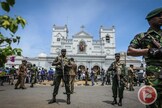
ISIS terror organization claimed responsibility, on Tuesday, for a series of coordinated bombings on Easter Sunday, in Sri Lanka’s capital of Colombo, which killed 321 people and injured 500 others.
The claim said, "The perpetrators of the attack that targeted nationals of the countries of the coalitions and Christians in Sri Lanka before yesterday are fighters from Daesh."
However, the terror group did not give evidence, such as photographs or videos of attackers pledging their loyalty to the group.
It is noteworthy that Sri Lankan officials blamed a local extremist group for the attacks.
The claim said, "The perpetrators of the attack that targeted nationals of the countries of the coalitions and Christians in Sri Lanka before yesterday are fighters from Daesh."
However, the terror group did not give evidence, such as photographs or videos of attackers pledging their loyalty to the group.
It is noteworthy that Sri Lankan officials blamed a local extremist group for the attacks.
22 apr 2019
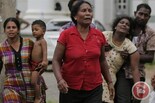
The number of people killed has risen to 290, including at least 32 foreigners, after a series of bombings hit Colombo, the capital of Sri Lanka, on Easter Sunday, targeting churches and hotels, and injuring over 500 people.
Sri Lankan authorities lifted a curfew in Sri Lanka, on Monday, although there were warnings that more attacks were possible.
There was still no claim of responsibility for the Easter Sunday bombings in Colombo City.
Sri Lankans accounted for most of the 290 people killed and 500 injured. Meanwhile, Sri Lankan government officials confirmed that 32 foreigners were also killed. These included people from the United Kingdom, the United States, Turkey, India, China, Denmark, the Netherlands, and Portugal.
Sri Lanka's Prime Minister Ranil Wickremesinghe convened Sri Lanka's top military officials at an emergency meeting of the National Security Council following the bombings and called for an emergency convening of the nation's parliament on Monday.
The Indian Ocean island of about 22 million people has Christian, Muslim, and Hindu populations of between about eight and 12 percent.
Sri Lankan authorities lifted a curfew in Sri Lanka, on Monday, although there were warnings that more attacks were possible.
There was still no claim of responsibility for the Easter Sunday bombings in Colombo City.
Sri Lankans accounted for most of the 290 people killed and 500 injured. Meanwhile, Sri Lankan government officials confirmed that 32 foreigners were also killed. These included people from the United Kingdom, the United States, Turkey, India, China, Denmark, the Netherlands, and Portugal.
Sri Lanka's Prime Minister Ranil Wickremesinghe convened Sri Lanka's top military officials at an emergency meeting of the National Security Council following the bombings and called for an emergency convening of the nation's parliament on Monday.
The Indian Ocean island of about 22 million people has Christian, Muslim, and Hindu populations of between about eight and 12 percent.
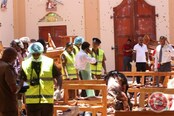
The coordinated Easter Sunday bombings that struck Sri Lanka’s capital of Colombo, targeting churches and luxury hotels, were carried out by seven suicide bombers, according to a Sri Lankan government investigator, on Monday.
Ariyananda Welianga, a forensic crime investigator, confirmed that after conducting an analysis of the attackers' body parts, it was made clear that they were suicide bombers.
Welianga said that most attacks were carried out by one bomber, while two others carried out the bombing at the Shangri-La Hotel.
In response to the attacks, Palestinian President Mahmoud Abbas also condemned the terrorist bombings and described the attacks as “criminal and gruesome.”
He said in a statement, “Terrorism is spreading as an epidemic across the world. I call on the countries of the world to cooperate to eradicate terrorism and not to tolerate with racist groups that incite violence and hatred.”
Abbas offered condolences to the people and to the President of Sri Lanka, as well as to the bereaved families.
Ariyananda Welianga, a forensic crime investigator, confirmed that after conducting an analysis of the attackers' body parts, it was made clear that they were suicide bombers.
Welianga said that most attacks were carried out by one bomber, while two others carried out the bombing at the Shangri-La Hotel.
In response to the attacks, Palestinian President Mahmoud Abbas also condemned the terrorist bombings and described the attacks as “criminal and gruesome.”
He said in a statement, “Terrorism is spreading as an epidemic across the world. I call on the countries of the world to cooperate to eradicate terrorism and not to tolerate with racist groups that incite violence and hatred.”
Abbas offered condolences to the people and to the President of Sri Lanka, as well as to the bereaved families.
21 apr 2019
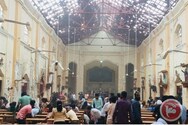
The Palestinian Foreign and Expatriates Ministry confirmed, on Sunday, that all Palestinians in Sri Lanka are safe and well following a series of bombings across Sri Lanka's capital of Colombo.
The ministry said that the Palestinian ambassador to Sri Lanka and the Palestinian Embassy are following up on the situation of the Palestinian community and tourists in Sri Lanka, and is in contact with them to check on their safety and find out their whereabouts to facilitate getting in contacts with them.
A series of coordinated bombings struck Colombo City on Sunday, targeting mostly churches and hotels. Up until now, more than 200 people have been killed and 400 others were injured.
Sri Lanka's Prime Minister Ranil Wickremesinghe convened Sri Lanka's top military officials at an emergency meeting of the National Security Council following the bombings and called for an emergency convening of the nation's parliament on Monday.
The ministry said that the Palestinian ambassador to Sri Lanka and the Palestinian Embassy are following up on the situation of the Palestinian community and tourists in Sri Lanka, and is in contact with them to check on their safety and find out their whereabouts to facilitate getting in contacts with them.
A series of coordinated bombings struck Colombo City on Sunday, targeting mostly churches and hotels. Up until now, more than 200 people have been killed and 400 others were injured.
Sri Lanka's Prime Minister Ranil Wickremesinghe convened Sri Lanka's top military officials at an emergency meeting of the National Security Council following the bombings and called for an emergency convening of the nation's parliament on Monday.
|
|
Sri Lanka's capital Colombo was struck by a series of bombings on churches and hotels that killed at least 160 people and injured over 400 others on Easter Sunday.
Most of the victims were killed in three churches, where Christian worshipers were attending Easter Sunday services, while three other bombings struck luxury hotels, the Cinnamon Grand, Kingsbury and Shangri-La, located in the heart of Colombo City, killing at least 35 foreigners. The other bombing occurred at a hotel near the national zoo in the center of Colombo, killing at least two people, and in the Orugodawatta suburb in the north of the city, another bomb was detonated. |
The first bombing was reported in a church located in the city. The other blasts followed within thirty minutes.
Sri Lanka’s police spokesperson, Ruwan Gunasekera, said that the injured were being evacuated while security forces sealed off the areas and commenced search operations.
Sri Lanka's Prime Minister Ranil Wickremesinghe convened Sri Lanka's top military officials at an emergency meeting of the National Security Council following the bombings and called for an emergency convening of the nation's parliament on Monday.
In addition, Sri Lanka’s Defense Ministry ordered a night-time curfew across the country and blocked access to a number of social media websites and applications.
Sri Lanka’s police spokesperson, Ruwan Gunasekera, said that the injured were being evacuated while security forces sealed off the areas and commenced search operations.
Sri Lanka's Prime Minister Ranil Wickremesinghe convened Sri Lanka's top military officials at an emergency meeting of the National Security Council following the bombings and called for an emergency convening of the nation's parliament on Monday.
In addition, Sri Lanka’s Defense Ministry ordered a night-time curfew across the country and blocked access to a number of social media websites and applications.
|
|
Israeli authorities denied to issue holiday entry permits for hundreds of Palestinian Christians in the besieged Gaza Strip, who were planning to visit holy sites in both Jerusalem and Bethlehem, during the Easter holiday and Palm Sunday.
Palestinian Christians from Gaza who were planning on visiting the holy sites or their families in the occupied West Bank and Israel, will not be able to do so this Easter holiday. Israel allowed only 200 Christians from Gaza, who are over 55-years-old to travel only to the Jordanian Kingdom through the Allenby border crossing, and did not issue permits for those hoping to visit the Church of Nativity in Bethlehem City and the Church of the Holy Sepulcher in East Jerusalem. Israeli rights group Gisha reported complaints against the Israeli authorities regarding the restrictions imposed on Christians who want to travel during |
the Jewish holiday of Passover, also known as Pesach, which coincides with Easter.
Gisha said, “This is a flagrant violation of the freedom of movement, freedom of worship and freedom of enjoying family life for the Christians in Gaza,” noting that the Strip is an example of a “wider Israeli racist policy.”
Gisha added, “Imposing such sweeping restrictions on movement cannot be justified by security needs.”
The rights group also stressed in a statement last week, “Israel is increasingly restricting movement between Gaza and the West Bank so as to deepen the separation between Palestinians torn between parts of the occupied Palestinian territory, and by doing so, advance and legitimize its annexation of the West Bank.”
Most Christians celebrate Easter on Sunday April 21st, while Orthodox Christians, who follow a different calendar, will mark it on April 28th. Many Gaza Christians belong to the Greek Orthodox community, which will celebrate the holiday on the latter date.
According to a February 2018 report issued by the Palestinian Authority Central Bureau of Statistics (PCBS), about 1,138 Palestinian Christians live in Gaza and almost all of them live in Gaza City, with many of them having family members in the West Bank.
Despite the travel ban, Palestinian Christians in Gaza celebrate Easter in a church in Gaza City.
Gisha said, “This is a flagrant violation of the freedom of movement, freedom of worship and freedom of enjoying family life for the Christians in Gaza,” noting that the Strip is an example of a “wider Israeli racist policy.”
Gisha added, “Imposing such sweeping restrictions on movement cannot be justified by security needs.”
The rights group also stressed in a statement last week, “Israel is increasingly restricting movement between Gaza and the West Bank so as to deepen the separation between Palestinians torn between parts of the occupied Palestinian territory, and by doing so, advance and legitimize its annexation of the West Bank.”
Most Christians celebrate Easter on Sunday April 21st, while Orthodox Christians, who follow a different calendar, will mark it on April 28th. Many Gaza Christians belong to the Greek Orthodox community, which will celebrate the holiday on the latter date.
According to a February 2018 report issued by the Palestinian Authority Central Bureau of Statistics (PCBS), about 1,138 Palestinian Christians live in Gaza and almost all of them live in Gaza City, with many of them having family members in the West Bank.
Despite the travel ban, Palestinian Christians in Gaza celebrate Easter in a church in Gaza City.
13 mar 2019
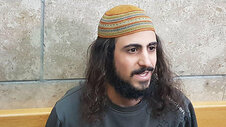
Yinon Reuveni
The Higher Presidential Committee for Church Affairs in Palestine condemned the decision of an Israeli court to acquit two Israeli settlers, for torching Jerusalem's Dormition Abbey in February 2016, on the basis of “insufficient evidence,” on Tuesday.
The committee said in a press release that the Israeli court’s decision is a “deviation from justice, even in the courts, when it comes to convicting Jews while arresting young Palestinians without charge or evidence or trials and for long periods of times that can reach dozens of years.”
The committee added that these racist and subversive actions by extremist Israelis under the protection of the courts and the Israeli government will lead to the creation of future Israeli generations molded with ideas and actions hostile toward the Palestinians.
One of the Israeli settlers, Yinon Reuveni, 23, was also accused of arson of the Church of the Multiplication of the Loaves and Fishes at Tabgha, on the shores of the Sea of Galilee, in June 2015.
The Higher Presidential Committee for Church Affairs in Palestine condemned the decision of an Israeli court to acquit two Israeli settlers, for torching Jerusalem's Dormition Abbey in February 2016, on the basis of “insufficient evidence,” on Tuesday.
The committee said in a press release that the Israeli court’s decision is a “deviation from justice, even in the courts, when it comes to convicting Jews while arresting young Palestinians without charge or evidence or trials and for long periods of times that can reach dozens of years.”
The committee added that these racist and subversive actions by extremist Israelis under the protection of the courts and the Israeli government will lead to the creation of future Israeli generations molded with ideas and actions hostile toward the Palestinians.
One of the Israeli settlers, Yinon Reuveni, 23, was also accused of arson of the Church of the Multiplication of the Loaves and Fishes at Tabgha, on the shores of the Sea of Galilee, in June 2015.
12 jan 2019
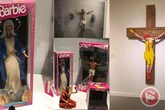
The Patriarchate added that they blame the municipality of Haifa for this exhibit. They said that the Municipality collects taxes, including from those Christians that were insulted by this exhibit.
This was especially insulting because the timing of the exhibit came just as the Greek Orthodox Christians were celebrating Christmas, according to their calendar.
The Israeli authorities claimed that the night before the protest, an unknown person threw a flaming bottle at the museum, causing minimal damage.
During the protest on Friday, Israeli police say that three of their officers were hit by rocks and bottles and injured. Dozens of Palestinian protesters were treated for the effects of tear gas inhalation.
The Israeli Cultural Minister, Miri Regev, on Thursday weighed in on the issue, saying that she had received “ many complaints of serious offense caused to the Christian community’s feelings”, and asked the Director General of Haifa Museums to remove the controversial artwork.
This was especially insulting because the timing of the exhibit came just as the Greek Orthodox Christians were celebrating Christmas, according to their calendar.
The Israeli authorities claimed that the night before the protest, an unknown person threw a flaming bottle at the museum, causing minimal damage.
During the protest on Friday, Israeli police say that three of their officers were hit by rocks and bottles and injured. Dozens of Palestinian protesters were treated for the effects of tear gas inhalation.
The Israeli Cultural Minister, Miri Regev, on Thursday weighed in on the issue, saying that she had received “ many complaints of serious offense caused to the Christian community’s feelings”, and asked the Director General of Haifa Museums to remove the controversial artwork.
1 jan 2019
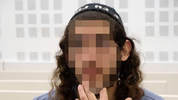
Judge slams behavior of investigators after police set up a fake prison cell, pretended to be inmates and even planted drugs in his bed in an effort to secure a confession from the young settler
The Central District Court in Lod on Tuesday threw out a confession given by an Israeli minor detained as part of a far-reaching investigation into Jewish terrorism, on the grounds that it was extracted by unlawful means and under duress.
The teen has been charged with several racially motivated offenses, including arson and damage to property in a 2013 attack at the Abbey of the Dormition in Jerusalem. During the attack, graffitti reading "Christians are monkeys" and “Christians are slaves" was sprayed on the walls of the church.
The youth was also questioned on suspicion of involvement in the deadly Duma terror attack of 2015, in which three members of a Palestinian family died in a fire started by Jewish extremists at their West Bank home. The court, however, found he was not involved in the attack.
The decision to throw out the teen's testimony was made after his attorney, Itamar Ben-Gvir, argued that the Shin Bet domestic security service and the police unlawfully obtained the confession from his client, who admitted to carrying out the hate crimes while he was in custody in Acre.
On Thursday, the investigative television program Fact reported that the youth had been placed in a fake prison cell in Acre Prison, while policemen disguised as his cellmates applied massive pressure on him to confess to his actions, including stopping him from sleeping and eating.
One of the policemen played the role of a prisoner serving a murder sentence, and officers even planted fake drugs under his mattress to pressure him.
Ben-Gvir argued in court that a red line had been crossed and that unacceptable investigative measures had been used to get the confession.
Throwing out the confession, Judge Michal Brandt called the behavior of the police “unfair, to say the least, as well as offensive and threatening,” the Times of Israel reported.
Ben-Gvir praised the court's decision, saying his client had been denied his basic rights.
"This is an important day for Israeli democracy. The time has come for the Shin Bet and the police to know that the Hilltop Youth (young exteme-right settlers) also have basic rights. All red lines have been crossed in this investigation. I'm glad the court accepted our claim and disqualified the confession," Ben-Gvir said.
The Central District Prosecutor's Office said in a statement that they may rethink their strategy in light of the ruling.
"The defendant was charged with severe offenses, whose ramifications are also felt in internationally. The police and Shin Bet used measures they believed to be within the boundaries of the law. The court rejected the confession given by the minor under these conditions, and we will thoroughly review the court's decision and consider our future actions."
The Central District Court in Lod on Tuesday threw out a confession given by an Israeli minor detained as part of a far-reaching investigation into Jewish terrorism, on the grounds that it was extracted by unlawful means and under duress.
The teen has been charged with several racially motivated offenses, including arson and damage to property in a 2013 attack at the Abbey of the Dormition in Jerusalem. During the attack, graffitti reading "Christians are monkeys" and “Christians are slaves" was sprayed on the walls of the church.
The youth was also questioned on suspicion of involvement in the deadly Duma terror attack of 2015, in which three members of a Palestinian family died in a fire started by Jewish extremists at their West Bank home. The court, however, found he was not involved in the attack.
The decision to throw out the teen's testimony was made after his attorney, Itamar Ben-Gvir, argued that the Shin Bet domestic security service and the police unlawfully obtained the confession from his client, who admitted to carrying out the hate crimes while he was in custody in Acre.
On Thursday, the investigative television program Fact reported that the youth had been placed in a fake prison cell in Acre Prison, while policemen disguised as his cellmates applied massive pressure on him to confess to his actions, including stopping him from sleeping and eating.
One of the policemen played the role of a prisoner serving a murder sentence, and officers even planted fake drugs under his mattress to pressure him.
Ben-Gvir argued in court that a red line had been crossed and that unacceptable investigative measures had been used to get the confession.
Throwing out the confession, Judge Michal Brandt called the behavior of the police “unfair, to say the least, as well as offensive and threatening,” the Times of Israel reported.
Ben-Gvir praised the court's decision, saying his client had been denied his basic rights.
"This is an important day for Israeli democracy. The time has come for the Shin Bet and the police to know that the Hilltop Youth (young exteme-right settlers) also have basic rights. All red lines have been crossed in this investigation. I'm glad the court accepted our claim and disqualified the confession," Ben-Gvir said.
The Central District Prosecutor's Office said in a statement that they may rethink their strategy in light of the ruling.
"The defendant was charged with severe offenses, whose ramifications are also felt in internationally. The police and Shin Bet used measures they believed to be within the boundaries of the law. The court rejected the confession given by the minor under these conditions, and we will thoroughly review the court's decision and consider our future actions."
Page: 2 - 1
